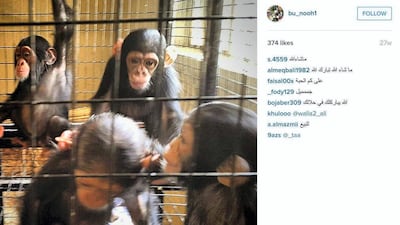The UAE government is calling on Ukraine and Syria to help it investigate the smuggling of exotic animals into the Gulf from the two countries.
International authorities have uncovered the movement of about 700 animals, worth $1 million, in the past 18 months from Ukraine to breeding centres in the region.
From there they are flown to other countries including the UAE, which is a major transit point for the illicit trade.
Airports and the authorities in the UAE are trained to recognise signs of trafficking but such is the scale of the illegal trade – and the profits to be made – that smugglers still risk using the country for transit.
“We know more than 700 animals have been relocated from Syria to the UAE and Bahrain in the past year,” said Dr Amir Khalil, a vet at the Austrian animal rescue organisation Four Paws.
“They were taken from abandoned zoos and a breeding station outside of Damascus, at Samer Al Husainawi. There have been monkeys, lions and other big cats and we know sub-contractors are getting them into these countries illegally.
“We know a big shipment of animals has been moved from Ukraine through Jordan to Syria.”
There is no record of these animals entering the UAE, and they are yet to appear on a tracking database run by the Convention on International Trade in Endangered Species of Wild Fauna and Flora, or Cites.
Hiba Al Shehhi, acting director of biodiversity at the Ministry of Climate Change and Environment, said investigations were under way and the ministry had contacted the Syrian and Ukrainian authorities.
“A total of five cheetahs accompanied by the due Cites certificates were exported from the UAE to Ukraine in 2015 and 2016,” Ms Al Shehhi said.
“As for the other species listed in the letter, they were not recorded in the UAE-Ukraine trade database. However, the UAE is a transit centre which means they could have transited through.
“The UAE is strongly committed to tightening controls on the movement and trade of endangered species through its airports, roads and seaports. In addition to setting a solid legislative foundation, the UAE has taken concrete steps to curb the illicit trafficking of wildlife species.”
Many species among the 700 animals, including big cats and monkeys, are believed to have become part of the illegal trade in exotic pets, where collectors buy through social media.
Border inspection documents in Ukraine from August last year show the movement of 500 monkeys, 12 cheetahs, 10 hyenas, 10 leopards, eight jaguars, 20 serval cats, 10 caracals and 70 African fennec foxes.
“It depends on the country where the animals are going to but usually an official of some kind would have to sign off any transit documents before they are moved,” said Timothy Husband, technical director of Dubai Safari.
“The route into Syria from Ukraine is unusual, so it could be a stepping stone into the UAE or Saudi Arabia.”
No official data exist for any movement of live cheetahs in or out of Ukraine since 2016.
Documents show a “private entrepreneur” in Odessa, Ukraine, was granted a permit to move two 10-month old lion cubs into the Samer Al Husainawi Zoo in Damascus – one farm at the centre of the illegal trade route.
The Cites document granting transport expired on November 9 but lacks information as to where the animals came from.
Wildlife experts say there are no official lion-breeding programmes in Ukraine, so questions remain as to how they were allowed to legally leave the country.
Animals Lebanon is a welfare organisation that cared for many big cats, including three tigers, trafficked through Lebanon on their way to a Syrian zoo.
“In 2009 I visited the Samer Al Husainawi Zoo in Syria, and last year locals confirmed to me the zoo was no longer functioning or open to the public,” said Jason Mier, executive director of Animals Lebanon.
“The Cites permits for the two lions lack any details of the importer and exporter such as phone number, licence number or email address.”
_______________
Read more:
Dubai at heart of countering global animal trafficking, report finds
Cheetahs sell for tens of thousands on 'gold mine' social media accounts across Middle East
Cheetah cub smugglers jailed for three years in raid on Gulf gateway
_______________
The covert movement of more than 700 animals from Syria raises concerns over the thriving online illegal pet trade.
“Just weeks ago there was an intended transfer from some of them from Jordan to the UAE,” Dr Khalil said. “It is a challenge to move this amount of animals but they are hugely valued.”
Just half of those animals listed for transport were likely to survive the journey to the Gulf because of the poor conditions in which they were kept.
Dr Daniel Stiles, an independent illegal wildlife trade consultant who has investigated poaching for the UN, was unsurprised by the Syrian links.
“Syria specialises in issuing Cites re-export permits, which require an export permit from the country of origin – which doesn’t exist because the animals are smuggled into Syria,” Dr Stiles said. “Final-destination countries will usually accept the fraudulent re-export permit and allow the illegal animals in.”
Other regional monitors have confirmed Syria has breeding centres in Aleppo and Damascus to provide exotic pets for private collectors.
Dr Sulaiman Tameer from the Kurdistan Organisation for Animal Rights Protection, lives less than an hour from Syria in the Duhok province of Iraqi Kurdistan.
“We have similar problems with exotic animals illegally coming into Iraq and Kurdistan from Syria,” Dr Tameer said. “Our information is that there are at least two of these farms selling exotic animals.
“We know that Mano, the small baby chimpanzee we recovered and sent to Kenya, came from Syria and we are now looking at cases of two lion cubs and a baby chimp from the same route.”



